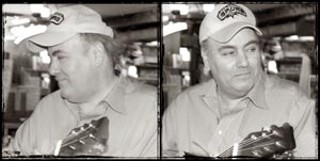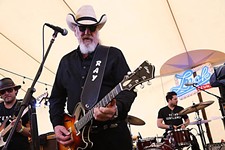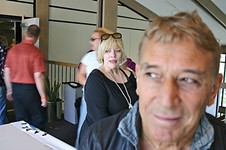Buried Alive in the Blues
Me and the Godfather and the favor I'll never forget
By Ed Ward, Fri., May 26, 2006

The chubby guy with the unkempt, slightly greasy hair fixed me with a stare from across his desk and said, in a high-pitched voice that didn't really match his appearance:
"Ed, in Austin, I am the blues."
That was the bad news and that was the good news. For better or worse, Clifford Antone was the blues in Austin. Take it or leave it. He was the Godfather, and what he said went. You got the feeling this was an image he cultivated, one he encouraged. He wanted you to know that he not only had friends, he had ... associates. There was this club called Antone's, and it was his fiefdom, his domain. You entered Antone's and you entered Clifford Antone's world.
It was a world of guitar-slingers, of women singing about no-good men, of revered elders helped onstage and encouraged to flights of greatness they might not have known they still had in them by the young guys playing gentle support in the band. You'd see those same guys playing with the ideas they'd picked up from those elders on, say, a Tuesday night on the same stage, with Clifford watching, one eye on the stage, the other on the door. Folklorists call that oral tradition. Clifford called it the blues.
I missed what seems to have been the great era of Antone's, when it was on Sixth Street and Muddy Waters and B.B. King and Albert King and the rest were at least somewhat frequent visitors and the house band was the Fabulous Thunderbirds. Actually, when I moved to Austin in October, 1979, I don't believe there was an Antone's, since he'd been chased out of the spot he'd made famous and was looking for another location.
What I find really peculiar, though, was that in the years previous to my move, I was never aware of the place at all. When i visited, my guides were all too deeply immersed in the Cosmic Cowboy thing, and they seemed to have ignored the fact that another American roots music was gaining a foothold in town. Maybe I wouldn't have been interested. I spent a decade in San Francisco, where "blues" was code for long-winded masturbatory guitar "jamming" over those same chords by guys looking for Claptonhood and settling for something considerably below it.

Not everyone, of course; I was friends with Michael Bloomfield and went to many of his gigs, especially if the magisterial Nick Gravenites was singing. Bloomer wasn't playing much, and Gravy would have to haul him out of his house to get up onstage. Gravenites wrote a song that would make a good epitaph for Clifford: "Buried Alive in the Blues." He'd written it for Janis Joplin, who died the day she was supposed to record it. That, too, was the blues, and I wasn't sure how close I wanted to get to it, Bloomfield's instrumental eloquence notwithstanding. He had his problems, too.
Yet the blues seemed to have a different resonance in Austin. Sure, it was about virtuosity; guitar players are guitar players, after all. But it wasn't quite so much about the Chicago/B.B. King kind of virtuosity. That was the lesson the Thunderbirds taught me when I finally got around to seeing them one evening at the Rome Inn. I was deep into the punk/New Wave axis at the time, and it seemed to me the T-Birds were a punk rock blues band, stripped to the bone, not playing a single note more than they needed to, pushing the whole song instead of using it as a vehicle for chorus after chorus of diddly-diddly guitar wank. No wonder the old guys liked to play with them. Once upon a time, after all, the blues had been about making hit records, three minutes long.
Eventually, Antone's reopened, at a former rug warehouse on Anderson Lane. It was just big enough to look really empty when it wasn't jammed, and it was a long ways to go back then, when most of Austin was to the south. I think this was the occasion on which I interviewed Clifford, and he delivered that quote about being the blues in Austin. Even then, I had to wonder.
The blues, by 1980, was terminally ill, at least the kind Clifford was espousing. Howlin' Wolf was dead, Muddy and Lightnin' Hopkins would die in the next couple of years, Freddie King was gone, Little Walter and Sonny Boy Williamson were long gone. These were mortal blows, and although there were many players in those traditions still working, they were mostly working the revival circuit. But there was also a place where the blues nestled comfortably against soul music, and this was still very much a going concern, especially in the South. People like Little Milton, Little Johnny Taylor, Denise LaSalle, Tyrone Davis, Bettye Lavette, Z.Z. Hill, and Benny Latimore were playing Austin – on the Eastside. True, to his credit, Clifford booked Bobby "Blue" Bland when he could (B.B. King had priced himself out of Clifford's range by then), and true, some of those names would have been a little obscure for some of Clifford's regulars, but I always wondered why he never booked Little Milton, for example. Milton had name recognition, but Clifford wouldn't discuss it.
The rug warehouse was a bust, and Austin heaved a collective sigh of relief when Antone's moved to 29th and Guadalupe, a place which, to me, was the real Antone's. Here was a place small enough to feel comfortable in even when there weren't that many people. Clifford used his juice to book big-name acts, charged a lot of money, and made enough to pay for the leaner nights. He started a record label, opened a record store across the street. He sometimes served Cajun food there, but more often, Ruby's would deliver barbecue across the alley.
And then he went and did something incredibly stupid. "Man, if you're doing crime, you don't go out to a titty bar with your friends and brag real loud about it," a person on the margins of the law commented to me at the time. "Cops never go to titty bars to relax, after all. And man, if you can't trust your employees, you shouldn't be in this business." Clifford had gone to South Austin to supervise the transfer of a shipment of pot from one truck to another and had been caught on the scene. Somehow the cops had known.
Clifford went to jail. So did I: with Jimmie and Stevie Ray Vaughan, whom Clifford had arranged to play a show at the prison where he was doing time in Big Spring. I was writing an article on the Vaughans for Musician magazine, and they were doing what they did best. It was a memorable event all around: the inmates loved the show, the band loved playing it, and Jimmie and Stevie were pals again now that Stevie had cleaned up.

Things were really never the same after that, although you have to give tons and tons of props to Susan Antone for stepping up to the plate and doing a great job of running the place while Clifford was gone. When he returned, he continued to book the place and hang out there. His presence was felt. Godfathers are like that, you know.
I left Austin in 1993, so I missed both the beginning and the end of Clifford Antone's story. I last saw him two years ago at Threadgill's and snapped a picture of him and Eddie Wilson shaking hands, emblematic, I remember thinking at the time, of an entire slab of Austin history and culture. So much of the scene he nurtured in Austin is gone now. Austin's a very different place now, and although that's probably not what actually killed Clifford Antone, it's surely on the list somewhere.
I had something of a contentious relationship with Clifford, but I always respected him. We might not have agreed, but I'll never deny that he stood up for what he believed, and that what he believed was a concrete, coherent set of beliefs, whether I shared it or not. I respected the hell out of him, and a lot of why is summed up by one of the most surreal incidents that ever happened to me in the course of covering the Austin music scene.
Iggy Pop was playing the Armadillo, and, as often happened with the venue's shows, it was all over by about 10:30pm. Iggy was in good shape, his demons mostly behind him, and he'd poured every ounce of his athleticism into an amazing show. I went backstage to see him; we've liked each other since I reviewed the first Stooges album for Rolling Stone in 1969. He was surrounded by members of the Austin punk elite, and said, "I want to go do something now. Is there any good music around this town tonight?"
Various punk bands were suggested and he slagged them off. "I don't wanna go see no fuckin' punk rock!" How about the Fabulous Thunderbirds, who were playing somewhere? "A white blues band? No fuckin' way!" Well, I said, there's not much else in town. Bobby Bland is at Antone's, but that's way up north, and since he's got members of his original band with him, it's also probably sold out. "Bobby Bland? That's what I want to do!" So while he sorted out transportation, I zoomed up MoPac to the rug warehouse to see what was going on.
As I'd suspected, the house was full, and the opening band was warming the crowd up. I found Clifford in his office and told him that Iggy and a couple of people who'd driven him were about to arrive. "No problem," he said. "I'll put them on the guest list." I followed him to the door, and sure enough, here were Iggy and his new friends. Clifford waved them in. Iggy said, "I hate to be a bother, but I just finished a long show at the Armadillo, and on the drive up here, I realized I'm more beat than I'd thought. Is there any place I could sit?" Clifford said "Just wait here," and went into his office. A few seconds later, a couple of the club's employees came out of the office carrying a large round table, which they managed to set up at the front of the stage, as Clifford motioned people back. He waved Iggy and his friends up to it, and they sat down.
Wow, I found myself thinking, only in Austin could I see Iggy Pop and Bobby Bland on the same evening. The best was yet to come: at one point in the show, Bobby stopped and announced, "We have a young gentleman in the audience, a very great performer, and I know he's already done his show this evening, but I was wondering if he'd like to come up here and do a number with me." What the..? "Ladies and gentlemen, I'd like you to give a warm Austin welcome to Mister, uh, Izzy Bob!" Up popped Iggy.

"You know 'St. James Infirmary,' right?" Bland asked, and Iggy nodded. The band went into the song, and as my jaw gaped open, Iggy did a credible job of trading lines with the blues great. I'd inched forward and was standing against a pillar, and at the song's end, Iggy jumped off the stage and ran up the aisle to where I was standing. "How'd you like that?" he asked with a grin. It was amazing, I said. "Hah! Just you watch. Ten years, and I'm gonna be in Vegas, baby! And" – and here he jabbed my chest with his finger on each word – "I'm gonna be great!" Then he ran back down the aisle to rejoin his companions.
So yeah, not only is Austin the only place I could have seen Iggy and Bobby Bland on the same evening, but only Clifford Antone could have masterminded the most bizarre – yet successful – duet I've ever seen. Clearly, he realized that this whoever-he-is-punk wouldn't have bothered to come if he didn't love the blues. That was good enough for him, so he went the distance for him. As he did for so many others. ![]()
From Our Archives:
"Blue Monday," Music, December 29, 2000
Twenty-five years and counting, the tradition lives on
"Those Magic Moments," Music, July 6, 2001
On the eve of his club's 26th anniversary, Clifford Antone remembers the masters
"Page Two," Columns, December 10, 1999
Antone's club listings
Antone's in the Austin Chronicle Live Music Venue Guide
"'Antone's: Home of the Blues'," Screens, March 19, 2004
Documentary world premiere at SXSW Film '04








